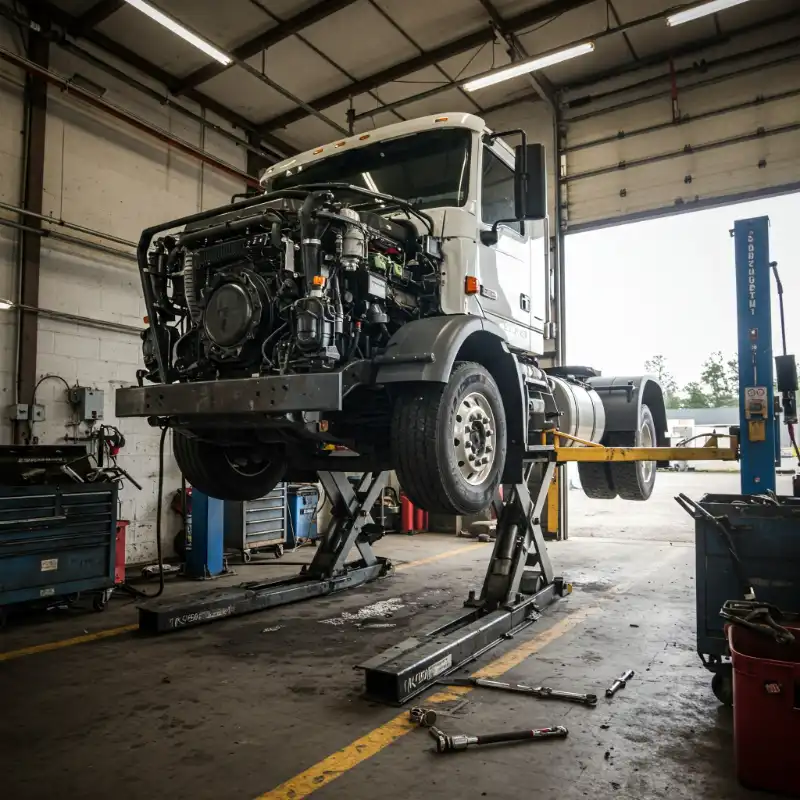1. Excessive Oil Consumption
If your engine is burning oil faster than usual, it could mean trouble. A high oil consumption rate often indicates worn piston rings or cylinder walls. These components are crucial for maintaining proper compression, and when they fail, oil slips into the combustion chamber, burning off and causing thick, blueish smoke.
How to Check:
- Monitor oil levels between scheduled changes.
- Look for oil leaks or excessive smoke from the exhaust.
- Pay attention to engine performance—loss of power may accompany high oil consumption.
2. Loss of Power and Poor Performance
Has your truck lost its usual torque and pulling power? A sluggish engine that struggles under load or on inclines might have worn cylinders, failing fuel injectors, or excessive carbon buildup. Loss of compression is a major red flag that internal components are wearing out, making a truck engine rebuild inevitable.
Warning Signs:
- Increased throttle input with little response.
- Struggling to maintain speed, especially with heavy loads.
- Decreased fuel efficiency due to an overworked engine.
3. Excessive Exhaust Smoke
Your exhaust smoke can tell you a lot about your engine’s health. Different colors point to different issues:
- Black smoke: Over-fueling, clogged air filters, or bad fuel injectors.
- Blue smoke: Burning oil due to worn piston rings or valve seals.
- White smoke: Coolant burning due to a cracked head, blown head gasket, or damaged cylinder liners.
4. Metal Shavings in the Oil
During routine oil changes, always inspect the oil and oil filter for metal shavings. Small amounts of metal dust are normal, but larger shavings signal internal wear and tear—think failing bearings, camshafts, or pistons.
Preventative Tip:
- Conduct regular oil analysis to catch problems before they escalate.
- If excessive metal debris is found, a teardown may be necessary.
5. Knocking or Strange Noises
A well-tuned diesel engine has a distinct, rhythmic hum. But if you start hearing loud knocking, rattling, or grinding, something’s amiss. These noises often point to:
- Rod knock: A sign of worn crankshaft bearings.
- Piston slap: Occurs when piston clearance increases due to cylinder wear.
- Timing issues: Problems with the camshaft, injectors, or valve timing.
6. Overheating Issues
Diesel engines are designed to run hot, but persistent overheating can cause severe damage. If your truck frequently runs hot despite a working cooling system, it may have:
- A blown head gasket allowing coolant to enter the cylinders.
- Cracked cylinder heads or blocks leading to coolant loss.
- Carbon buildup restricting airflow and causing higher combustion temperatures.
What to Do:
- Inspect the radiator, thermostat, and water pump for malfunctions.
- Monitor coolant levels and check for leaks.
- Run compression tests to check for internal coolant leaks.
7. Low Compression Readings
Compression is crucial in diesel engines. Without it, the air-fuel mixture won’t ignite properly, leading to poor performance, hard starts, and misfires. A compression test can diagnose whether your cylinders are sealing properly.
Compression-Related Issues:
- Worn piston rings or cylinders.
- Burned or stuck valves.
- Head gasket failure allowing pressure to escape.
If multiple cylinders show low readings, it’s time to consider an engine rebuild.
8. Hard Starts and Frequent Stalling
A diesel engine should fire up reliably, even in cold weather. If yours struggles to start, takes longer than usual to crank, or stalls unexpectedly, the problem could stem from:
- Worn-out piston rings reducing compression.
- Failing injectors leading to incorrect fuel delivery.
- Weak fuel pumps not providing enough pressure.
Ignoring these symptoms can leave your truck sidelined, costing you time and money.
9. High Fuel Consumption
Has your fuel efficiency tanked lately? An engine in need of a rebuild works harder to produce power, leading to excessive fuel consumption. Common causes include:
- Carbon deposits reducing efficiency.
- Leaky fuel injectors dumping excess fuel into the cylinders.
- Worn internal components increasing friction and resistance.
Tracking miles per gallon (MPG) can help you catch a failing engine before it’s too late.
Revive Your Engine’s Performance Today
If your truck is showing multiple signs of engine failure—high oil consumption, loss of power, excessive smoke, overheating, and metal shavings in the oil—a truck engine rebuild might be necessary. Staying ahead of these issues can prevent costly breakdowns and extend the lifespan of your fleet.
If you need a truck engine rebuild in Texas, you can count on OTR Fleet Service. Contact us today for an expert engine inspection and keep your fleet running strong!










.webp)





























